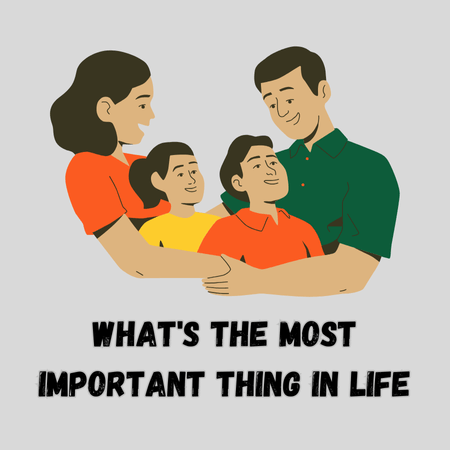Life is a journey filled with experiences, challenges, and moments that shape who we are and what we value. Amidst the chaos and unpredictability of life, one question often lingers in the minds of many: what is the most important thing in life? While the answer to this question may vary from person to person, certain universal truths seem to resonate with people across different cultures and backgrounds.
Long-term Fulfillment vs. Short-term Happiness
While short-term pleasures are delightful, long-term fulfillment often brings deeper satisfaction. It’s the difference between enjoying a piece of cake and feeling proud of maintaining a healthy lifestyle. Both have their place, but long-term fulfillment often leads to a more sustained sense of well-being.
1. Relationships and Connections
One of the fundamental aspects that many consider to be the most important in life is relationships. Whether it’s with family, friends, partners, or even a sense of community, the connections we form with others can bring immense joy, support, and meaning to our lives. Nurturing these relationships and creating bonds based on love, trust, and respect can enrich our existence in ways that material possessions or achievements cannot.
2. Health and Well-being
Another critical element that often tops the list of priorities is health and well-being. Without good health, it can be challenging to fully enjoy life’s experiences and pursue our goals and dreams. Taking care of both our physical and mental health is essential for a fulfilling and balanced life. Prioritizing self-care, exercise, proper nutrition, and seeking help when needed are vital components of maintaining overall well-being.
3. Personal Growth and Fulfillment
Many people find that personal growth and self-fulfillment are crucial for a meaningful life. This can involve setting goals, pursuing passions, learning new skills, and challenging oneself to become the best version possible. Engaging in activities that bring a sense of purpose and accomplishment can lead to a deep sense of fulfillment and satisfaction.
4. Gratitude and Mindfulness
Practicing gratitude and mindfulness is another key factor contributing to a fulfilling life. Taking the time to appreciate the small joys, being present in the moment, and cultivating a positive outlook can significantly impact our overall well-being. Gratitude helps us focus on what we have rather than our lack, leading to a greater sense of contentment and happiness.
5. Contribution and Impact
Making a positive impact on the world and contributing to something greater than ourselves is also considered essential by many. Whether through acts of kindness, volunteering, supporting important causes, or simply being there for others, the sense of purpose that comes from helping and uplifting those in need can bring immense satisfaction and fulfillment.
Relationships and Connections
Family Bonds
Family bonds are the emotional connections between family members. They provide a sense of belonging, security, and support. These relationships are often built on shared experiences, love, and care. Family bonds can be nurtured through:
Communication: Open and honest discussions about feelings, thoughts, and experiences.
Quality Time: Spending time together through activities, meals, or traditions.
Support: Offering emotional, financial, or practical help during difficult times.
Respect: Acknowledging and valuing each family member’s individuality and opinions.

Friendships
Friendships are voluntary relationships between individuals who share mutual affection, trust, and respect. These relationships are crucial for emotional well-being and social support. Key aspects of healthy friendships include:
Trust: Relying on each other for honesty and confidentiality.
Support: Being there for each other during both good and bad times.
Mutual Interests: Sharing hobbies, interests, or values.
Communication: Regularly keeping in touch and discussing various aspects of life.
Romantic Relationships
Romantic relationships are intimate connections between partners characterized by love, passion, and commitment. These relationships require effort and mutual understanding to thrive. Important elements include:
Communication: Open and honest discussions about feelings, expectations, and concerns.
Trust and Loyalty: Faithfulness and reliability in the relationship.
Respect: Valuing each other’s boundaries, opinions, and individuality.
Quality Time: Spending meaningful time together to strengthen the bond.
Community and Social Connections
Community and social connections refer to relationships and interactions within a larger group, such as neighborhoods, clubs, or social networks. These connections contribute to a sense of belonging and collective support. They can be fostered through:
Participation: Engaging in community events, activities, or volunteer work.
Support Systems: Creating networks for mutual aid and assistance.
Shared Goals: Working together towards common objectives or causes.
Inclusivity: Ensuring that everyone feels welcomed and valued in the community.
Purpose and Passion
Finding one’s purpose and following one’s passion are integral components of living a fulfilling and meaningful life. When individuals align their actions with what truly drives them, they often experience a profound sense of satisfaction and fulfillment. Here are some key points to consider when exploring the concepts of purpose and passion:

Purpose:
- Meaning and Direction: Having a sense of purpose provides individuals with a clear direction and meaning in life. It gives them a reason to get out of bed each day and guides their decisions and actions toward a greater goal.
- Impact and Contribution: A strong sense of purpose often involves making a positive impact on others or the world at large. It can be derived from helping others, pursuing a cause, or creating something of value that benefits society.
- Personal Growth: Pursuing one’s purpose can lead to personal growth and self-discovery. It challenges individuals to step out of their comfort zones, learn new skills, and overcome obstacles, ultimately leading to a deeper understanding of themselves.
Passion
Passion is a powerful emotion that drives enthusiasm and commitment towards activities or goals. It fuels creativity, dedication, and persistence. Key aspects of passion include:
- Inspiration: Acts as a source of motivation and excitement.
- Engagement: Leads to deep involvement and immersion in activities.
- Creativity: Sparks innovation and original thinking.
- Fulfillment: Bring joy and satisfaction through the pursuit of what you love.
Spirituality and Inner Peace
Spirituality is a broad concept that involves seeking a connection with something greater than oneself. It often encompasses a search for meaning, purpose, and a deeper understanding of life, whether through religious beliefs, rituals, or a personal journey. Key aspects of spirituality include feeling a bond with a higher power, nature, or the universe; finding a sense of direction and significance; experiencing transcendence; and fostering inner growth through qualities like compassion and wisdom. Practices such as meditation, prayer, spending time in nature, and serving others can cultivate spirituality.
Inner Peace:
Inner peace, on the other hand, is a state of mental and emotional calmness, free from anxiety, stress, or worry. Achieving inner peace involves self-awareness, acceptance, and maintaining a sense of balance in life. It includes embracing oneself with all strengths and imperfections, staying present through mindfulness, letting go of negative emotions, and maintaining equilibrium between different life aspects like work, relationships, and personal time. Practices like mindfulness meditation, gratitude exercises, breathing techniques, and journaling can help achieve inner peace.

Spirituality and inner peace are deeply interconnected. A strong spiritual foundation provides purpose and meaning, contributing to inner peace, while achieving inner peace can deepen spiritual experiences and connections. Daily practices incorporating meditation, prayer, and reflection, along with mindful living and participation in spiritual or community groups, can foster both spiritual growth and inner peace. These elements are essential for a fulfilling and balanced life, helping individuals navigate challenges with resilience, compassion, and joy.
Work-Life Balance
Work-life balance refers to the equilibrium an individual seeks between their professional responsibilities and personal life interests and commitments. It entails managing time and energy effectively to fulfill work obligations while also nurturing personal well-being, relationships, and leisure activities. Achieving a healthy work-life balance is crucial for overall mental, emotional, and physical health, as it helps reduce stress, prevent burnout, and enhance productivity and satisfaction in both professional and personal domains.
Managing Work and Personal Life
Managing work and personal life effectively is essential for maintaining overall well-being and satisfaction. It involves creating boundaries, prioritizing tasks, and nurturing both professional responsibilities and personal interests. Key strategies include:
- Setting Boundaries: Establish clear boundaries between work and personal time. Define specific hours for work and dedicate uninterrupted time for personal activities and relaxation.
- Prioritizing Tasks: Identify and prioritize tasks based on importance and deadlines. Focus on completing high-priority tasks during work hours to minimize carryover into personal time.
- Time Management: Use time management techniques such as prioritization, scheduling, and breaking tasks into smaller, manageable steps. This helps maintain productivity and efficiency in both work and personal life.
- Communication: Maintain open communication with supervisors, colleagues, and family members about expectations and commitments. Clear communication helps manage workload and ensures understanding and support from all parties involved.
- Self-Care: Prioritize self-care activities such as exercise, adequate sleep, healthy eating, and relaxation techniques. Taking care of physical and mental well-being enhances overall resilience and productivity.
- Flexibility and Adaptability: Be flexible and adaptable in managing unexpected changes in work or personal schedules. Adjust plans as needed while maintaining focus on priorities and goals.
- Delegate and Outsource: Delegate tasks at work when possible and outsource personal tasks that can be handled by others. This frees up time and reduces stress from managing multiple responsibilities.

Financial planning and management
Financial planning and management are essential pillars of a secure and fulfilling life. By taking proactive steps to understand and optimize your finances, you not only gain peace of mind but also pave the way for achieving your long-term goals and aspirations. A highly recommended resource in this journey is The Total Money Makeover Updated and Expanded: A Proven Plan for Financial Peace by Dave Ramsey. This book offers practical strategies and a step-by-step plan to eliminate debt, build wealth, and secure a solid financial future. Whether you’re saving for retirement, planning for your children’s education, or simply aiming to build a stable financial future,
Freedom and Independence
refers to the state of being unrestricted and able to act, think, or speak without coercion or limitation. It encompasses various aspects, including:
- Personal: The right to make decisions about one’s own life, beliefs, and actions.
- Political: The ability to participate in governance and express opinions without fear of repression.
- Economic Having the opportunity to pursue economic activities and benefit from the results without excessive governmental or societal interference.
Independence, on the other hand, involves self-sufficiency and the ability to function and thrive without reliance on others for support or control. It includes:
- Financial Independence: The ability to sustain oneself economically through employment, entrepreneurship, or investments.
- Personal Independence: The capability to manage one’s affairs, responsibilities, and decisions without relying excessively on others.
- Emotional Independence: Having a sense of self-confidence, resilience, and inner strength to navigate life’s challenges independently.
Must Read
- I Have No Friends Or Family – Find Peace In Solitude
- Why Am I So Emotional? –Reasons Why You May Feel Extra
- Why Do I Hate Myself? Reasons & How To Overcome
Conclusion
In contemplating life’s most important facets, it becomes evident that happiness, health, relationships, purpose, and personal growth form the foundational pillars of a fulfilling existence. Each aspect intertwines with the others, creating a tapestry of experiences that shape our journey. Happiness isn’t merely about fleeting pleasures but encompasses a deep sense of contentment and fulfillment. Health, both physical and mental, enables us to fully engage with life’s opportunities. Relationships provide support and companionship, enriching our experiences. Discovering our purpose and aligning our actions with it gives our lives meaning and direction. Personal growth through learning and resilience prepares us for challenges and enhances our journey.
